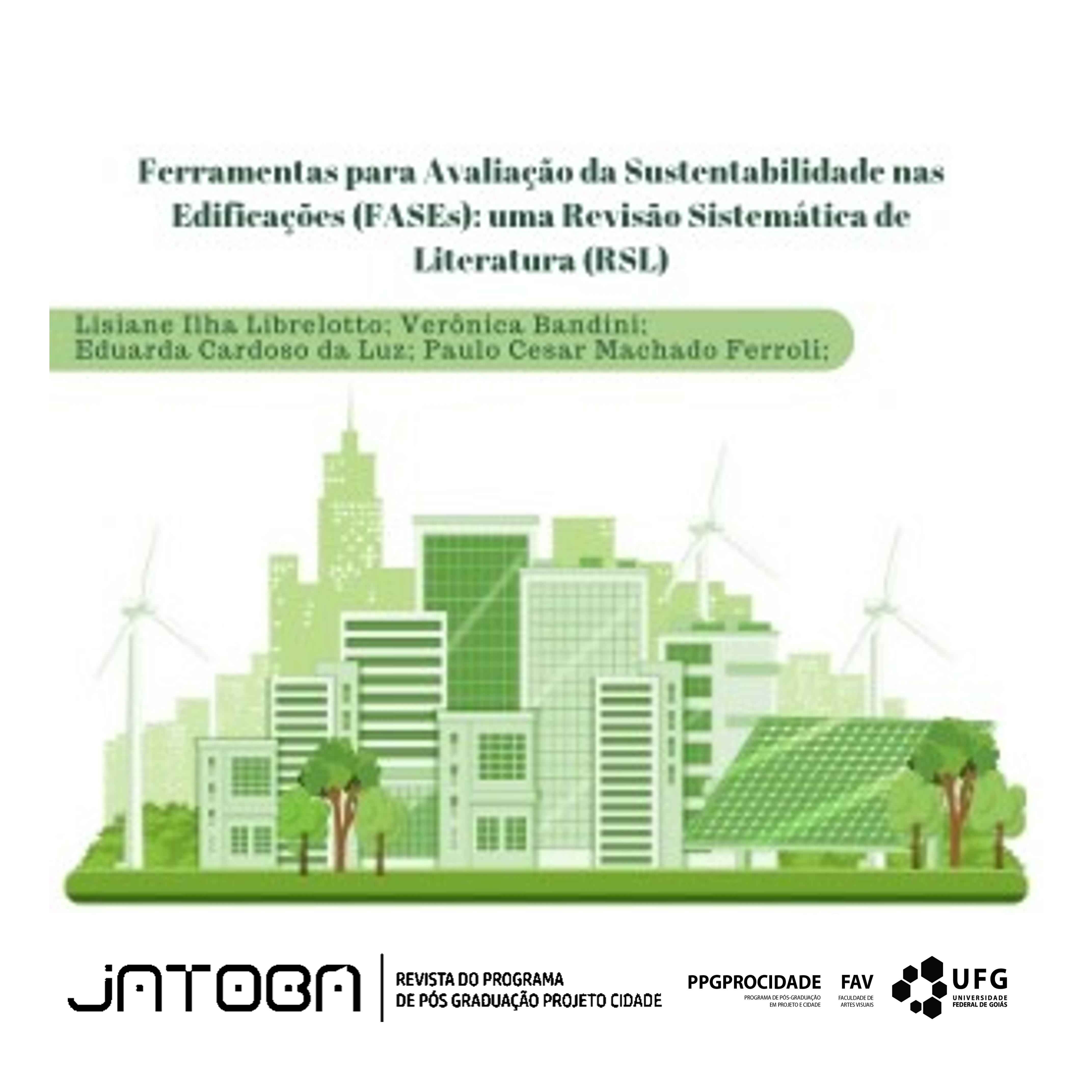Buildings Sustainability Assessment Tools (BSATs):
a Systematic Literature Review (SLR)
DOI:
https://doi.org/10.5216/revjat.v5.76768Keywords:
Buildings; Technology; Sustainability; Evaluation.Abstract
This article proposes to develop a research that has as its theme, the evaluation of sustainability and its tools, having its application focused on the scope of buildings. Faced with this scenario, this work aimed to identify tools and methods to assess the sustainability of buildings (BSAT - buildings sustainability assessment tools). Through an exploratory review and a systematic literature review (SLR) carried out on the CAPES journal portal and on google scholar, it was possible to fulfill the objective of quantifying the tools available for evaluating the building. Therefore, from the exploratory review, the search terms for RSL were identified, the main indicators used in the methods that define a sustainable building and the conditions established in these evaluations. As a result, a list of 220 tools for assessing sustainability in buildings was obtained, the systematization of the content of 80 of these tools (in documents available on the USAT project page), the main dimensions of the assessment, indicators, authors and publication sources.
Downloads
References
ELKINGTON, John. Cannibals With Forks - The Triple Bottom Line of 21st Century Business. New Society Publishers. Gabriola Islands BC: Canada, 1998.
FERRARI, Simone et al. New Level (s) framework: Assessing the affinity between the main international Green Building Rating Systems and the European scheme. Renewable and Sustainable Energy Reviews, p. 111924, 2021.
FINK, A. Conducting research literature reviews: From the Internet to paper (2nd ed.). Thousand Oaks: Sage, 2005.
GOULART, Solange. Sustentabilidade nas edificações e no espaço urbano. Apostila-Disciplina Desempenho Térmico de Edificações-ECV5161, Universidade Federal de Santa Catarina. Florianópolis, 2008. Disponível em: https://labeee.ufsc.br/sites/default/files/disciplinas/ECV5161_Sustentabilidade_apostila_0_0.pdf. Acesso em: 28 fev. 2022.
GUPTA, Rajat; GREGG, M. Empirical Evaluation of the Energy and Environmental Performance of a Sustainably-designed but Under-utilised Institutional Building in the UK. Energy and Buildings 128 (2016): 68-80
HÄKKINEN, Tarja; BELLONI, Kaisa. Barriers and drivers for sustainable building. Building Research & Information, v. 39, n. 3, p. 239-255, 2011.
IEA Annex 31. Energy related environmental impact of buildings. 2001. Disponível em: https://www.iisbe.org/annex31/index.html. Acesso em: março de 2023.
JAMOUSSI, Bassem; ABU-RIZAIZA, Asad; AL-HAIJ, Ali. Sustainable Building Standards, Codes and Certification Systems: The Status Quo and Future Directions in Saudi Arabia. Sustainability, v. 14, n. 16, p. 10314, 2022
DO, Cristina; JIMÉNEZ-RIVERO, Ana; GARCÍA-NAVARRO, Justo. Improved sustainability certification systems to respond to building renovation challenges based on a literature review. Journal of Building Engineering, v. 45, p. 103575, 2022.
KANG, Hyeyon, Yeunsook Lee, and Sunkuk Kim. Sustainable Building Assessment Tool for Project Decision Makers and Its Development Process. Environmental Impact Assessment Review 58 (2016): 34-47.
LAZAR, N.; Chithra, K. Comprehensive bibliometric mapping of publication trends in the development of Building Sustainability Assessment Systems. Environ. Dev. Sustain. 2021, 23, 4899–4923.
LIBRELOTTO, L. I.; Ferroli, P. C. M.; Sanon, S. ; Matanna, L. . Avaliação da Sustentabilidade do edifício na Escala Urbana. In: Anais ENSUS 2017 - V Encontro de Sustentabilidade em Projeto. Florianópolis: UFSC/Virtuhab, 2017. v. 1. p. 163-177.In:< https://drive.google.com/file/d/1VYHbcPzDb8ZOfcvT1SGxyGdBUDtSRWHs/view.
LÓPEZ, Carmen Díaz; CARPIO, M., MORALES, M., & ZAMORANO, M.. A comparative analysis of sustainable building assessment methods. Sustainable Cities and Society, v. 49, p. 101611, 2019.
LÓPEZ, Carmen et al. Passive cooling strategies to optimise sustainability and environmental ergonomics in Mediterranean schools based on a critical review. Building and Environment, p. 109297, 2022.
LÓPEZ, Carmen et al. Analysis of the scientific evolution of the circular economy applied to construction and demolition waste. Sustainability, v. 13, n. 16, p. 9416, 2021.
NOROUZI, Nima. The more Sustainable buildings, the more Sustainable societies: An Overview on Building Sustainable Evaluation in the World. Energy Studies Review, v. 24, n. 1, 2020.
OKOLI, Chitu. Guia para realizar uma revisão sistemática da literatura. Tradução de David Wesley Amado Duarte; Revisão técnica e introdução de João Mattar. eaD em Foco, 2019;9 (1): e748. DOI: https://doi.org/10.18264/eadf.v9i1.748.
Pons-Valladares, Oriol, and Jelena Nikolic. Sustainable Design, Construction, Refurbishment and Restoration of Architecture: A Review. Sustainability (Basel, Switzerland) 12, no. 22 (2020): 9741.
SEMINARA, Paola, Behrang Vand, Seyed Masoud Sajjadian, and Laura Tupenaite. Assessing and Monitoring of Building Performance by Diverse Methods. Sustainability (Basel, Switzerland) 14, no. 3 (2022): 1242.
SHAFAGHAT, Arezou, Ali Keyvanfar, Muhd Zaimi Abd. Majid, Hasanuddin Bin Lamit, Mohd Hamdan Ahmad, Mohamed Salim Ferwati, and Sib Krishna Ghoshal. "Methods for Adaptive Behaviors Satisfaction Assessment with Energy Efficient Building Design." Renewable & Sustainable Energy Reviews 57. 250-59. 2016.
SINOU, Maria, and Stella Kyvelou. "Present and Future of Building Performance Assessment Tools." Management of Environmental Quality 17, no. 5 (2006): 570-86.
STAUSKI, Gintaras. Green Architecture Paradigm: From Urban Utopia to Modern Methods of Quality Assessment/zaliosios Architekturos Paradigma: Nuo Urbanistiines Utopijos Iki Siuolaikiniu Tvarumo Vertinimo Metodikyu. Science Future of Lithuania 5, no. 3 (2013): 181.
USAT. Urban Sustainability Assessment Tool/ESA-B. Grupo de Pesquisa VirtuHab. Disponível em: <https://usat.paginas.ufsc.br/>. 2023.
VIERRA, Stephanie. Green building standards and certification systems. National Institute of Building Sciences, Washington, DC, 2016.
VEZZOLI, C.; MANZINI, E. Design for Environmental Sustainability. Londres: Springer, 2008.
YU, Xu, and Yuehong Su. Daylight Availability Assessment and Its Potential Energy Saving Estimation –A Literature Review. Renewable & Sustainable Energy Reviews 52 (2015): 494-503.

Downloads
Published
How to Cite
Issue
Section
License
Copyright (c) 2023 Jatobá Journal

This work is licensed under a Creative Commons Attribution 4.0 International License.
- Autores mantém os direitos autorais e concedem à revista o direito de primeira publicação, com o trabalho simultaneamente licenciado sob a Licença Creative Commons Attribution 4.0 que permite o compartilhamento do trabalho com reconhecimento da autoria e publicação inicial nesta revista.
- Autores têm autorização para assumir contratos adicionais separadamente, para distribuição não-exclusiva da versão do trabalho publicada nesta revista (ex.: publicar em repositório institucional ou como capítulo de livro), com reconhecimento de autoria e publicação inicial nesta revista.
- Autores têm permissão para publicar e distribuir seu trabalho online (ex.: em repositórios institucionais ou na sua página pessoal) após a publicação inicial nesta revista, já que isso pode gerar alterações produtivas, bem como aumentar o impacto e a citação do trabalho publicado (Veja O Efeito do Acesso Livre).
- Foram feitos todos os esforços para identificar e creditar os detentores de direitos sobre as imagens publicadas. Se tem direitos sobre alguma destas imagens e não foi corretamente identificado, por favor, entre em contato com a revista Jatobá e publicaremos a correção num dos próximos números.














